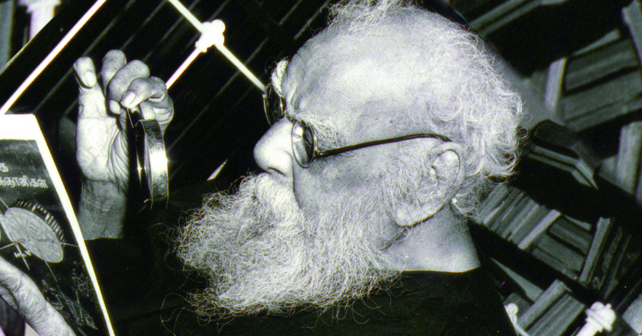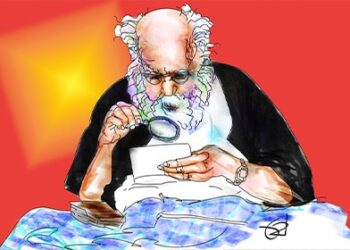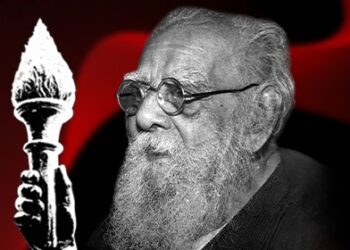The following text is the character depiction of Rama, as portrayed in the original ‘Ramayana’ by Valmiki. All the depictions are authenticated as per the verses of the epic which have not been disputed till now. The depiction of the other characters in the epic, Ramayana are summarised in the book “True Ramayana” the compilation of the speeches and writings by Thanthai Periyar
– Editor
Let us now consider Rama and study his character:-
1. Rama was quite aware that the kingdom was virtually handed over to Kaikeyi at the time of her marriage. He himself told this to Baratha (Ayothia Kandam, 107th Chapter).
2. His amiable conduct towards the people, his father and Kaikeyi was only motivated by his desire to usurp the throne. (He was all along a snake under the grass).
3. He acquiesced himself in all the devices which his father was making to crown him in the absence of Baratha.
4. Fearing that Lakshmana might envy at his lot and do him any harm, Rama cajoled him saying, “Lakshmana! Only on your behalf I am going to be crowned. Really you are going to rule the country” (Ayothia Kandam, 4th Chapter). In the end Lakshmana had no concern over the affairs of the state.
5. All through he had been feeling diffident within himself whether the function would end in success or in fiasco.
6. He lamented secretly when Dasaratha pronounced, “The Kingdom is not for you. You must go to the forest” (Ayothia Kandam, 19th Chapter).
7. He mournfully revealed to his mother: “It has been ordained that I have to lose the kingdom, forego the princely comforts and the tasteful meat-dishes and to go to the forest to eat the vegetables and fruits.” (Ayothia Kandam, 20th Chapter.)
8. With a heavy heart he said to his wife and mother: “The Kingdom that has been about to become mine has slipped out of my hands (Ayothia Kandam, 20, 26, 94th Chapters) and also I have been ordained to go to the forest”.
9. He approached Lakshmana and characterised his father (Dasaratha) as a criminal and said, “Will any fool agree to send away to the forest a person who has all through been carrying out his will? (Ayothia Kandam, 53rd Chapter).
10. Rama married many wives. This is found in the translation of Valmiki Ramayana published by Mr. C.R. Sreenivasa Iyengar in the year 1925 (Second Edition – Ayothia Kandam, 8th Chapter, Page 28). He (Mr. C.R.S. Iyengar) says, “Though Rama had married Sita to be the queen he married many other wives for sexual pleasure in accordance with the royal custom. Manmatha Nath Dather says, “Rama’s wives were used to take pleasure in company with their servant women. In the same way your (Kaikeyi’s) daughter-in-law (Baratha’s wife) would plunge herself in sorrow.” (His translation published in 1892-Ayothia Kandam, page 202, 8th Chapter) The term “Rama’s wives” has been used in many places in Ramayana.
11. Though Kaikeyi’s affection towards Rama was beyond doubt, Rama was all along insincere and artful to her.
12. Rama had been pretending to be honest and affectionate towards Kaikeyi and in the end he accused her that “Kaikeyi was a wicked woman” (Chapters 31 and 53, Ayothia Kandam).
13. Though Kaikeyi was devoid of ill feelings yet Rama charged her that “Kaikeyi would ill-treat my mother”. (Ayothia Kandam, 31 and 53rd Chapters).
14. “She may murder my father.” Thus Rama charged Kaikeyi insolently. (Chapter 53, Ayothia Kandam).
15. In the forest whenever Rama encountered occasions which made him feel that danger was imminent, many a time he exclaimed that “Kaikeyi’s desire is fulfilled; Kaikeyi will be satisfied”.
16. In the forest he told Lakshmana, “As our father has grown old and infirm and as we have also come to the forest, Baratha with his wife will be ruling over Ayothia joyfully without any opposition.” (Ayothia Kandam, 53rd Chapter). This brings to light his innate baseness, ambition to capture the throne and jealousy.
17. When Kaikeyi said to him, “Rama! The king desired me to convey to you that Baratha should be crowned King of Ayothi and you should go to the forest,” he replied “the king has never told me that he would give the kingdom to Baratha”. (Ayothia Kandam, 19th Chapter).
18. He called his father “a fool, an idiot.” (Ayothia Kandam, 53rd Chapter).
19. He appeals to his father “to continue rulling the country and let none ascend the throne until he has returned from the forest.” Thus he put a spoke in the wheel to check Baratha’s ascendancy to the throne (Ayothia Kandam, 34th Chapter).
20. “If I am enraged I can myself crush all my enemies and become the king. But I desist from taking this course for the fear that I will be scorned at, by the people at large” thus Rama showed his disregard for justice and truthfulness (Ayothia Kandam, 53rd Chapter).
21. He told his wife, Sita: “You cater to the taste of Baratha without earning his ill-feeling. This will yield much benefit to us later.” (Chapter 26, Ayothia Kandam).
22. Baratha hearing the news of Rama’s banishment went to the forest to take him back to the country. On seeing Baratha, Rama questioned him. “O Bharatha, are you chased away by the citizens? Have you come here out of your unwillingness to help our father?” (Ayothia Kandam, Chapter 100).
23. “Now your mother’s desires are accomplished, is she happy?” (Ayothia Kandam, Chapter 100), thus Rama further asked Baratha.
24. Baratha assured to Rama that he gave up his claim to the throne. Then only Rama disclosed to Baratha the secret that Dasaratha had already handed over the kingdom to his (Baratha’s) mother, Kaikeyi. (Chapter 107, Ayothia Kandam).
25. Baratha having made over his kingdom to Rama, returned to Ayothi with the shoes of Rama. He placed them on throne and led an ascetic life for fourteen years. He pined that Rama did not return on the fixed day; so he was making preparations to throw himself into fire. Such an upright and noble person was suspected by Rama. When Rama reached the outskirts of Ayothi, he sent Hanuman to Baratha to inform him, “I have come with a great force and also with Vibishana and Sugriva. Then observe the impressions in his face and also the steps he hurries up to take soon on hearing this, because it is hard for any one to relinquish the pleasures and the luxuries of ruling which Ayothi abounds with.” (Chapter 127, Uttara Kandam).
26. Rama was ever suspicious of Sita’s character and asked her to plunge herself into the fire and come out to prove her chasity. Even though Sita had undergone this trial prescribed by Rama, yet Rama found out Sita’s pregnancy. The doubt about the chastity of Sita was then a subject matter in the lips of everyone. Drawing the attention of Sita to this opinion of the people about her chastity and at the same time without revealing to Sita his own finding, Rama caused Sita being taken to the forest and left there when she was pregnant.
27. When Valmiki asserted the chastity of Sita, yet Rama did not believe it and so she had to die, getting down into the hollow of the earth.
28. He made friends with Sugriva and Vibishana knowing that they were knaves and that they approached him with the treacherous intention to kill their brothers and usurp the throne.
29. He stealthily killed Vali who had done him no harm, from behind, for the sake of Vali’s disloyal brother. This Rama who had not dared himself to fight face to face with Vali is hailed as a hero by the ignorant and greatly praised by the Brahmins by adding greater emphasis.
30. Even, while accepting the surrender of Vibishana, Rama unknowingly revealed his own evil mindedness and treachery. Rama admired Baratha that none on earth except Bharatha could embrace the Dharma of loyalty and obedience to his elder brother however vicious he (elder brother) might be. He wondered whether there was any other brother (born of the same father and mother) who would be of Baratha’s type. (Uttara Kandam, Chapter 17) Thus Rama in a way accepted that he was wicked.
31. While killing Vali, Rama justified his action by explaining to him (Vali) that the rule of “Dharma need not be adhered to in the case of beasts” and yet Rama killed Vali on the ground that Vali had not conducted himself as a rational being ought to. Without making any attempt to get the explanation of Vali for charges levelled against him, Rama killed Vali relying wholly on the word of the selfish Sugriva.
32. Rama disfigured and mutilated many women by cutting off their noses, breasts, ears, etc. and tortured them (Soorpanagai, Ayomuki).
33. Rama killed many women (Thadagai).
34. Rama on several occasions uttered lies to women.
35. Rama insulted women, thus – “Women should not be trusted,” and “Secrets should not be confided to wife” (Ayothia Kandam, Chapter 100)
36. Rama had always an undue lust for sexual pleasure.
37. Rama killed and ate many lives unnecessarily.
38. Rama said that he had been to the forest only to kill the Rakshasas (Dravidians) and that he had also been to the forest to keep up the word given to somebody else that he would destroy the Rakshasas (Aranya Kandam, Chapter 10).
39. Determined to drag the Rakshasas into a war, Rama entered Ravana’s territory despite the protest of Sita (Aranya Kandam, Chapter 9 and 10).
40. While fighting with Karan, Rama said: “I have been sent to the forest charged with the only mission to slay Rakshasas” (Aranya Kandam, Chapter 29).
41. With a selfish motive Rama surrendered himself to Sugriva, who was worthless and treacherous, saying, “Accept me,” “Show mercy on me.”
42. Having known that Vibishana had betrayed his own brother (Ravana), Rama took him to his side (Uttara Kandam, Chapter 17).
43. Having already assured the kingdom of Lanka to Vibishana (Uttara Kandam, Chapter 18) Rama sent messenger, Angatha, to Ravana with a message that he would disown Lanka if Sita was returned to him (Rama). “Tell Ravana that I would leave Lanka to him if Sita is released” (Uttara Kandam, Chapter 40). This proves that Ravana was free from any other slur and that Rama was an untrustworthy man.
44. Baratha, Kaikeyi, the citizens and the Guru all went to the forest and implored Rama to return to the country. They even resorted to “Satyagraha” before Rama. But Rama was obdurate and replied, “I am determined to carry out my father’s word and not to pay heed to anyone else.” Thus he refused to return. This same Rama agreed to accept the throne disregarding the word of father (Dasaratha’s promise to Kaikeyi that he would hand over the kingdom to her son (Baratha) (Yuddha Kandam, Chapter 130).
45. Not only did he consent to ascend the throne but from the time Rama was desired to go to the forest by his father till he returned to Ayothi and go himself enthroned, he was nurturing nothing else but his ambition, care and hope for the throne. Rama revealed this on many occasions through his own utterances.
46. Sambuka was slain (by Rama) because he was making penance which was forbidden to him by Vedas as he was a “Sudra” of Dravidian Race (Uttara Kandam, Chapter 76).
47. After throwing Lakshmana into a river (Uttara Kandam, Chapter 106) Rama like an ordinary man fell down into a river and died. Then Rama was reborn as Vice-Indra (Uttara Kandam, Chapter 110).
48. Looking at his hand Rama said the Sanskrit slogan “O right hand, you kill this Asche Sudra unhesitatingly as killing this Sudra is the only way to get back the life of the deceased Brahmin boy. Are you not one of the limbs of Rama?” (Valmiki Ramayana).
NOTE: This Rama who mercilessly took away the life of Sambuka for no other fault than that he was making penance is held to be the Avatar (Incarnation) of Vishnu! If there were kings like Rama now! Alas! What would be the plight of those who are called “Sudras” the meaning of which is ‘Sons of prostitutes’?
49. The bow that was broken by Rama was Siva’s. This bow was already a broken one. (Refer ‘Abidhana Chintamani’ Written by Mr. Singaravelu Mudaliar – Pages 157, 331, 571, 663, 894, 1151, 1173 and 1494).
50. This is supported by various Ramayanas and the story of Parasuram. Look at Rama’s age when he broke the bow. When Rama broke this bow, according to his mother, he was then 5 years old; according to his father, he was about 10. According to his wife (Sita) his age was 12. Whatever it might be that it was already a broken bow is true according to the story.
The views of Navalar Dr. Somasundara Bharathiar:
Rama according to the Valmiki Ramayana, was not an upright man. He had a hand in many acts of perfidy.
Rama was quite cognizant of the fact that he had no just claim over the country and that Baratha was the legal heir.
Rama’s father, Dasaratha at the time of the marriage of Baratha’s mother, “Kaikeyi” had given word to the father of Kaikeyi, that “the son born of Kaikeyi would be the King of Ayothi”. Only on this condition Kaikeyi was given in the marriage to Dasaratha.
Rama knew this fact and that he himself confessed this truth.
Rama himself pointed out this to Baratha and also implored him not to blame his mother Kaikeyi.
This was known to Rama’s mother, Kausalya, to Vashishta and to other Rishis (Sages) and ministers. To be brief Rama’s mother, Rishis, Gurus and ministers were the accomplices of Dasaratha in the conspiracy hatched by him to deprive Baratha of the throne treacherously and to bring Rama as the King of Ayothi.
Source : Collected Works of Periyar E.V.R., published by The Periyar Self – Respect Propaganda
Institution, Chennai






